September 11

Muslim detainees at Guantanamo are “indefinite prisoners of war,” held on suspicion of crimes they may or may not have committed. It would be easy to believe that Guantanamo is unique in regards to how it treats those the United States has deemed its enemies. But in reality, Guantanamo is an extension of the U.S. prison system.

What does it mean, now two decades past this traumatic event, to “never forget” 9/11? And why are we simultaneously encouraged to “move on from the past” when it comes to other great American tragedies, like the genocidal erasure of Indigenous peoples, or the horrific violence against Black people from chattel slavery through Jim Crow?

On September 11th, 2001, while walking my dogs over to the Hudson River in the Greenwich Village where I lived, I heard the sound of two low-flying planes. I then witnessed everything that happened, standing there with my neighbors in utter, total disbelief.
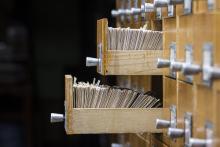
[After 9/11] Many of us feel a deep desire for revenge and violent retribution. We know how natural that is. We want to strike back at the perpetrators. And it is true: We do need to find and punish them. But we must not let that need be overwhelmed by sheer rage. We need to counter those who want to bomb indiscriminately, to “take them out” with missiles, or even to use everything in our arsenal. ...
Can we together agree that retribution is not the way of Jesus? Can we remain steadfast in nonviolence, despite the skepticism of those who embrace violence as a way of fighting violence? Can we repudiate belief in redemptive violence? Christians must behave as Christians no matter how much our society and churches ridicule nonviolence as idealistic and ineffective. If we cannot be faithful in such a crisis as we presently face, when will we?
Finally, we must cling to God by blind faith in such a time as this. To the question, Where is God in all this? we can answer, Where God always is: nearer than breathing and closer than hands or feet. But just as the clouds of dust and smoke and falling debris blotted out the sun on Sept. 11, so horror of this dimension blots out the light of God. In such a time, we cannot perhaps feel God’s presence, but it is there, and we have to cling to it even as we scream at the silence of God.
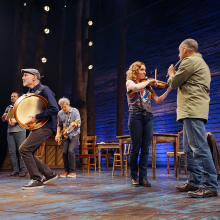
WE ALL HAVE a story of where we were that September morning, when the crumbling skyline of New York City brought the country to a standstill. For people on thousands of airplanes in flight that morning, their stories began with emergency landings and sitting for hours on the tarmac in unexpected places after U.S. airspace closed. Of those stranded “plane people,” 7,000 arrived in Gander, Newfoundland—an island town of about 10,000 locals and limited resources. The new Broadway musical “Come From Away” provides a snapshot of the rest of that story.
At a preview performance in February, the audience was on its feet for an ovation before the lights went down. For 100 minutes the musical allows the audience to pause and reflect on the events of Sept. 11. Claude Elliott, the mayor of Gander (played in the show by Joel Hatch), introduced the 10th-anniversary commemoration of 9/11 in Gander by saying, “We honor what was lost. But we also commemorate what we found.” To sit in the audience alongside New Yorkers with intimate connections to that day and tourists with their own reasons for being there was to pay tribute to those memories as part of a community of strangers.

In a spirit of remembrance of the terrible events of Sept.11, 2001, as well as the policies that came afterward leading to endless wars, I want to call your attention to a statement that Sojourners put together in the immediate aftermath of the attacks, entitled "Deny Them Their Victory.” This document was developed in consultation with Jewish, Muslim, and Christian clergy, and the breadth of participation has made it an extensively inclusive religious statement, with more than 3,900 signers. Its insights feel just as true today as they were then. Now 15 years on, it is worth reflecting on the ways we have succeeded in living up to the values stated below, as well the ways we have failed to do so.
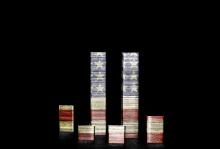
Of course, those places were disappearing even when I lived there — that’s part of the charm of New York City, things come and go. In the city that’s very name has been changed to stay current, old things are constantly made new.
But it never became less jarring to note the Twin Towers’ absence on the horizon.

Pope Francis embraced survivors of 9/11 in the footprints of the Twin Towers, then prayed for peace at an interfaith service beside the last column of steel salvaged from the fallen skyscrapers.
Arriving straight from his speech to the United Nations on Sept. 25, Francis met with 10 families from the 9/11 community — people who survived the destruction, rescued others from the inferno, or lost loved ones in the worst terrorist attack in U.S. history, executed by religious zealots.

Some social and trauma theorists believe these issues are directly symptomatic of an undiffused, collective trauma around the event of 9/11 — exacerbated by our post-modern, technocratic society, in which our witness of one another is often relegated by social media personas and devices. The environment is controlled, protected, guarded — a false sense of security that instead perpetuates isolation and disconnection. This raises a question as to where, and whether, we are experiencing integrated and authentic community as we heal.
It is widely acknowledged that supportive and caring community is an absolutely necessity in trauma repair. To be sure, the answer is complex and dynamic. But perhaps on this day of remembrance, rather than re-enacting our dissociative narratives, we can attempt to reimagine and embrace courageously an authentic witness — to continue the work towards a restorative, integrative, and peaceful future.
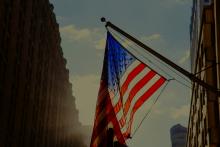
My friends and colleagues are generally aware that before I began working at Sojourners, I was a patent examiner at the U.S. Patent and Trademark Office (USPTO) for six and a half years. What most of them do not know, however, is that I interviewed for that job — a five-minute drive from the Pentagon — on September 11, 2001.
Early that morning, I decided to take the Metro rather than drive to the USPTO’s offices in Crystal City, Va. I reasoned that if I got the job, I would want to get some idea about my future daily commute. This would prove to be a fortunate decision later on.
Even before the end of my trip to Crystal City, I had already heard news of the first World Trade Center tower being hit. When I arrived at the office, I hoped the interviewer would remember me after our conversation. He did — but considering the significance of all that happened that day, my concerns about employment now seem minuscule in hindsight.
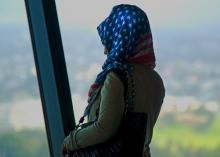
If our nation is to remember the lives of all who have suffered because of 9/11, Christians will need to do their part to renegotiate the terms for who and what we remember. Otherwise, “never forget” will remain a well-intended but shallow slogan that encourages us to elevate some lives above others, and to turn a blind eye to the violence, injustice, and hatred directed at Muslims in our name.
If our nation is to remember the lives of all who have suffered because of 9/11, Christians will need to do their part to renegotiate the terms for who and what we remember. Otherwise, “never forget” will remain a well-intended but shallow slogan that encourages us to elevate some lives above others, and to turn a blind eye to the violence, injustice, and hatred directed at Muslims in our name.
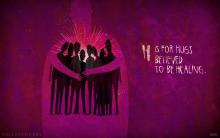
As a native New Yorker, I can never forget Tuesday, September 11, 2001. I was in college, but heading to my part-time job that morning. My car was being fixed, so my father drove me to work. There was an unusual amount of traffic and as we turned on the radio, we heard a reporter talk about a plane that hit the World Trade Center.
The first thought we had was that this was an accident. It had to be an accident, right? As we listened to the reports though, the second plane hit and it was clear that something was very, horribly, terrifyingly wrong.
From our office in Queens, we watched the towers burn and then collapse. The image of the great cloud of smoke and debris encompassing the skyline has been burned on my brain. And a few days later, while handing out sandwiches to mourners at the makeshift memorial at Union Square with my parents’ church and non-profit organization, the feeling of hugging a total stranger while she wept on my shoulder will never leave me.
It is impossible to forget.
I must admit the timeliness on the part of HBO to air the season finale of The Leftovers in the week of 9/11. Tom Perotta, who authored the play on which the show is based, purposely included allusions to 9/11. Rather than a theological treatise on the Rapture, it is a beautiful case study in grief and the excruciating tension between the desire to move forward and the need to remember.

That was a bumper sticker Sojourners published at the outset of the Iraq war more than a decade ago. American church leaders had not only opposed the war but offered an alternative: "An Alternative to War for Defeating Saddam Hussein, A Religious Initiative." We not only presented it to Colin Powell’s personal council and Tony Blair, but also printed full-page ads in every major British newspaper the day before their Parliamentary debate and vote on the war. The U.K.’s Secretary of State for International Affairs, Clair Short, told me the only real alternative on the table in their Cabinet meetings was “The American church leaders’ plan,” which, she said, was seriously discussed. U.S. and U.K. leaders showed they were drawn to an alternative plan to war that would remove any weapons of mass destruction that Saddam Hussein might have had (which he did not) and even to ultimately remove him from power but without going to war. Pope John Paul II was also opposed to the potential war. Both the Vatican and the American church leaders warned that the potential costs of a war in Iraq could include increasing the scope and threats of international terrorism. ISIS is that sad prophecy come true; the habit of war prevailed.
I have always believed that any alternative to war must still address the very real problems at hand — just in a more effective way. To say that “war is not the answer” is not only a moral statement but also is a serious critique of what doesn’t work; wars often fail to solve the problems and ultimately make them worse. War has to answer to metrics, just as more peaceful alternatives do. The war in Iraq was a complete failure with enormous human and financial costs; ISIS is now one of the consequences.
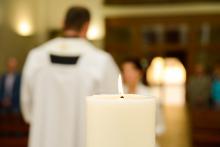
Churches flung open their doors on September 11, 2001, and people gathered on that day, and for some days later. There was a draw to sacred space in the midst of our everyday space being turned into dust–profane, unholy, hollowed out. The liturgies I attended in those days that followed were stripped down, bare, and profoundly vulnerable. The psalms were prayed. People wept together. We clung close. We resisted asking questions of meaning, and allowed ourselves to grieve, to lament.
A lot fewer churches flung open their doors on September 11, 2002. And even fewer today. The gravitational pull to gather in sacred space has waned. And it has become impossible, for the most part, to disentangle our liturgies from our politics. No longer gathering together out of unvarnished need for the divine presence, some of us gather now precisely to ascribe meaning to the unfathomable through the inextricable linking of nationalism with religion.
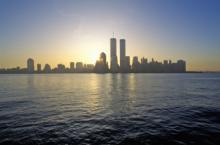
As a survivor of the Sept. 11 terrorist attacks on the World Trade Center, I worry about how we will remember that tragic day 50, 100, even 200 years from now.
I worry because our nation does a poor job of commemorating our most historic heroes and events. Our efforts to honor history consistently lead to one of two disappointing outcomes.
Our official holidays have become increasingly commercialized. Consider the relatively recent exploitation of Thanksgiving and Martin Luther King Jr. Day.
Virtually all other anniversaries have been marginalized. Consider how little attention is paid each summer to the July 20th anniversary of the first Apollo moon landing, one of humanity’s most impressive achievements.
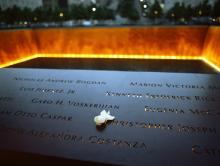
It’s been 14 years since our government declared war on terrorism. How are we doing? It feels like a disastrous game of Whack-A-Terrorist, doesn’t it? We kill one terrorist hiding in one hole, and out pops another one from another hole. Now we are facing the newest threat, a terrorist organization seeking to set up a nation-state, ISIS or IS, as its leadership prefers to be called. The Islamic State, at least, would be a concrete opponent. If they hold on to territory and establish a functioning government, we could at least declare war on a tangible target. Though regrettable it would at least make sense within the logic of war in which states fight other states.
In a recent article for Patheos.com, David French uses Christian Scripture as a justification for “responding to ISIS with wrath and vengeance.” French is a lawyer, a captain in the U.S. Army Reserve and senior counsel at the American Center for Law and Justice. He claims that, according to the Apostle Paul’s letter to the Romans, while individuals are called upon to love their enemies, there is no such call placed on governments. In fact, God has instituted governmental authority in order to execute his wrath against evildoers. And apparently, or so Romans 13 puts it according to French, to know who the evildoers are one simply needs to look at who governments are punishing. French quotes the relevant passage, Romans 13:3-5:
For rulers hold no terror for those who do right, but for those who do wrong. Do you want to be free from fear of the one in authority? Then do what is right and you will be commended. For the one in authority is God’s servant for your good. But if you do wrong, be afraid, for rulers do not bear the sword for no reason. They are God’s servants, agents of wrath to bring punishment on the wrongdoer. [Emphasis added by French.]
French concludes that American Christians should have no difficulty determining the correct response to ISIS. Why? By the fact of determining that justice must be executed against ISIS, our government has determined that their violence is not only an offense against American citizens (he names the beheading victims, journalists James Foley and Steven Sotloff) but against God himself.
French’s analysis strains credulity. Doesn’t he realize that the Romans to whom Paul was writing were themselves victims of government persecution? Does he think that these persecuted Christians felt they were being justly punished? And what about Paul himself, a Roman citizen who was persecuted and executed by the Roman government? Doesn’t French realize that by his own argument, the Roman authorities were executing God’s judgment against Paul? And by his own analysis, French is a captain in a military force that is from its origins a justifiable target for God’s wrath. Why? Because the founding act of the United States was a rebellion against a government, and “whoever resists authority resists what God has appointed, and those who resist will incur judgment.” (Romans 13:2)

Alexander was having a terrible, horrible, no good, very bad day.
It's a children's story. I know. A no good, very bad day ... how do you prepare your kids for that kind of day where nothing seems to go right, where at every turn knobs break and we step in puddles and get gum stuck in our hair?
Maybe, we tell ourselves, that we can move to Australia and everything will be better.
Well, no. Terrible, horrible, no good, very bad days happen there, too. They happen everywhere. Everywhere. It's a great book.
So what do we do about them? The classic children's book doesn't answer the question for us. Not really. It's just a little bit of truth telling with fun illustrations. Some days are just terrible, horrible, no good, very bad days.
But as we grow older, we learn that though these days do simply happen, that there are attitudes one can have, there are approaches to these days one can take.

It’s been five years now that Talat Hamdani has been able to talk about her son without crying, but she still prefers mostly not to tell his story.
“It’s all over the Internet,” she said.
She’s stopped talking about how she initially didn’t worry when her son, Mohammad Salman Hamdani, who was a cadet with the New York City Police Department, didn’t answer his cellphone that night; about how police questioned her and her husband when authorities couldn’t find their son’s body, to see if he had any terrorist connections; about the New York Post headline a month after the attacks — “Missing – Or Hiding? – Mystery Of NYPD Cadet From Pakistan,” that cast him as a suspect in the 9/11 attacks.
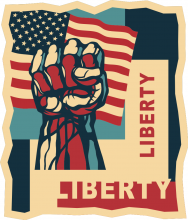
On Palm Sunday many will hear the Gospel of Luke’s perspective surrounding Jesus’ celebrated entry into Jerusalem (Luke 19:28-40). In hearing this well-known portion of the New Testament, we are often led to wonder how the same crowds that so graciously and enthusiastically welcomed Jesus would passionately and viciously call for his death just a few days later. In trying to comprehend the sudden and significant shift in public opinion, we recognize that the crowds did not swing their support independently, but rather, they were acting under the influential push of propaganda.
As Luke’s Gospel reminds us, in between Jesus’ entry into Jerusalem and the calls for his crucifixion, the “chief priests and the scribes” plotted to put Jesus to death (22:2). As these powerful elites were “afraid of the people”, they conspired in a power-protecting push to have Jesus humiliated, tortured, and brutally killed. And so, while Luke’s Gospel does not provide exact details into the strategies of the chief priests and scribes, their motivations appear to be clear, as they, and others within the ruling class, perceived Jesus as a risk and thus needed to ensure his quick and clear elimination. As a result, due to the influential influx of propaganda, combined with an overly complicit public, just a short time after Jesus was welcomed as a king he was sentenced to death as a criminal.

Out of the chaos, to the rhythm of the Lord’s Prayer, John Mahony, a retired U.S. Army colonel who was managing projects for Blue Cross/Blue Shield, sensed something that reminded him of when his mother would wrap him up as he’d climb out of a cold swimming pool, and he would be held, safe and warm, in loving arms.
“As I walked down that stair, somewhere between the 12th floor and the 10th, somewhere between ‘Our Father’ and ‘Thy will be done,’ that same feeling came over me," Mahony said. "Suddenly, I was wrapped in warmth, and love, and comfort. In that smoky, wet stairway, in a burning building, surrounded by a thousand frightened people; I felt wonder. I felt God’s peace, and I knew that regardless of the physical outcome, everything would be all right.”